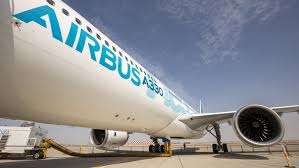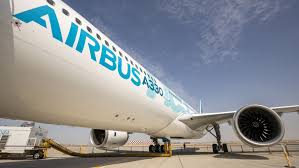
Three visual concepts of plane with "zero-emission" that will be powered by hydrogen was unveiled recently by Airbus.
This unveiling is being viewed as the latest effort of the European plane making giant to draw attention of the public towards its "zero-emission" ambitions in the wake of European governments pushing companies to shift to cleaner energy as a part of the recovery plans from the novel coronavirus pandemic.
During the unveiling process, Airbus also announced its target of putting these zero emission aircraft into commercial service by 2035. Analysts and industry experts, including engine makers such as Safran have however described the target as being ambitious.
Under its "ZEROe" initiative, airbus has included working concepts for two aircraft that looks like conventional planes. The one of them is a turbofan jet engine that has the capacity to carry between 120 and 200 passengers over 2,000 nautical miles or 3,700 km. The other concept is that of a turboprop with a capacity of carrying up to 100 people for 1,000 nautical miles.
To power the engines of these aircraft, the planes will burn hydrogen instead of air traffic fuel, which will be stored in the rear fuselage.
A third proposed aircraft comprises of a revolutionary "blended wing body" design which is similar to one that the company had presented in February.
Work on a demonstrator is also being carried out by Airbus at the same time and the company expects to announce some results in 2021.
"The demonstrator will allow us to assess what the most promising architecture is," Airbus Chief Technology Officer Grazia Vittadini said in an interview to the media. "We see it as applicable to all Airbus products eventually."
She said that it would be incumbent on the company to select the right technology for the new hydrogen fueled planes if the company is to meet its 2035 deadline.
However, according to other industry executives, achieving commercialization of such as clean break in propulsion could take as long as until 2040.
One of the major challenges for Airbus will be to safely store liquid hydrogen in the aircraft because it is very volatile and therefore it needs to stored at very low temperatures.
While dismissing concerns about the claims of hydrogen being unsafe in its concept, Airbus has called for massive investment in new energy infrastructure.
Hydrogen as a fuel to power transportation has been in discussions since the 1970s. However this concept of using hydrogen as a fuel to power vehicles still remains too expensive for widespread usage. But proponents of this technology claim that prices would be lowered by infrastructure investment and rising demand.
Further, carbon emissions are created in the process of extracting hydrogen gas from natural gas – which is the most common method used today to manufacture hydrogen.
Airbus however said that renewable energy would be used for production of the hydrogen used for aviation as well as extracted from from water with electrolysis. That will be through a carbon-free process if powered by renewable electricity.
(Source:www.foxbusiness.com)
This unveiling is being viewed as the latest effort of the European plane making giant to draw attention of the public towards its "zero-emission" ambitions in the wake of European governments pushing companies to shift to cleaner energy as a part of the recovery plans from the novel coronavirus pandemic.
During the unveiling process, Airbus also announced its target of putting these zero emission aircraft into commercial service by 2035. Analysts and industry experts, including engine makers such as Safran have however described the target as being ambitious.
Under its "ZEROe" initiative, airbus has included working concepts for two aircraft that looks like conventional planes. The one of them is a turbofan jet engine that has the capacity to carry between 120 and 200 passengers over 2,000 nautical miles or 3,700 km. The other concept is that of a turboprop with a capacity of carrying up to 100 people for 1,000 nautical miles.
To power the engines of these aircraft, the planes will burn hydrogen instead of air traffic fuel, which will be stored in the rear fuselage.
A third proposed aircraft comprises of a revolutionary "blended wing body" design which is similar to one that the company had presented in February.
Work on a demonstrator is also being carried out by Airbus at the same time and the company expects to announce some results in 2021.
"The demonstrator will allow us to assess what the most promising architecture is," Airbus Chief Technology Officer Grazia Vittadini said in an interview to the media. "We see it as applicable to all Airbus products eventually."
She said that it would be incumbent on the company to select the right technology for the new hydrogen fueled planes if the company is to meet its 2035 deadline.
However, according to other industry executives, achieving commercialization of such as clean break in propulsion could take as long as until 2040.
One of the major challenges for Airbus will be to safely store liquid hydrogen in the aircraft because it is very volatile and therefore it needs to stored at very low temperatures.
While dismissing concerns about the claims of hydrogen being unsafe in its concept, Airbus has called for massive investment in new energy infrastructure.
Hydrogen as a fuel to power transportation has been in discussions since the 1970s. However this concept of using hydrogen as a fuel to power vehicles still remains too expensive for widespread usage. But proponents of this technology claim that prices would be lowered by infrastructure investment and rising demand.
Further, carbon emissions are created in the process of extracting hydrogen gas from natural gas – which is the most common method used today to manufacture hydrogen.
Airbus however said that renewable energy would be used for production of the hydrogen used for aviation as well as extracted from from water with electrolysis. That will be through a carbon-free process if powered by renewable electricity.
(Source:www.foxbusiness.com)














